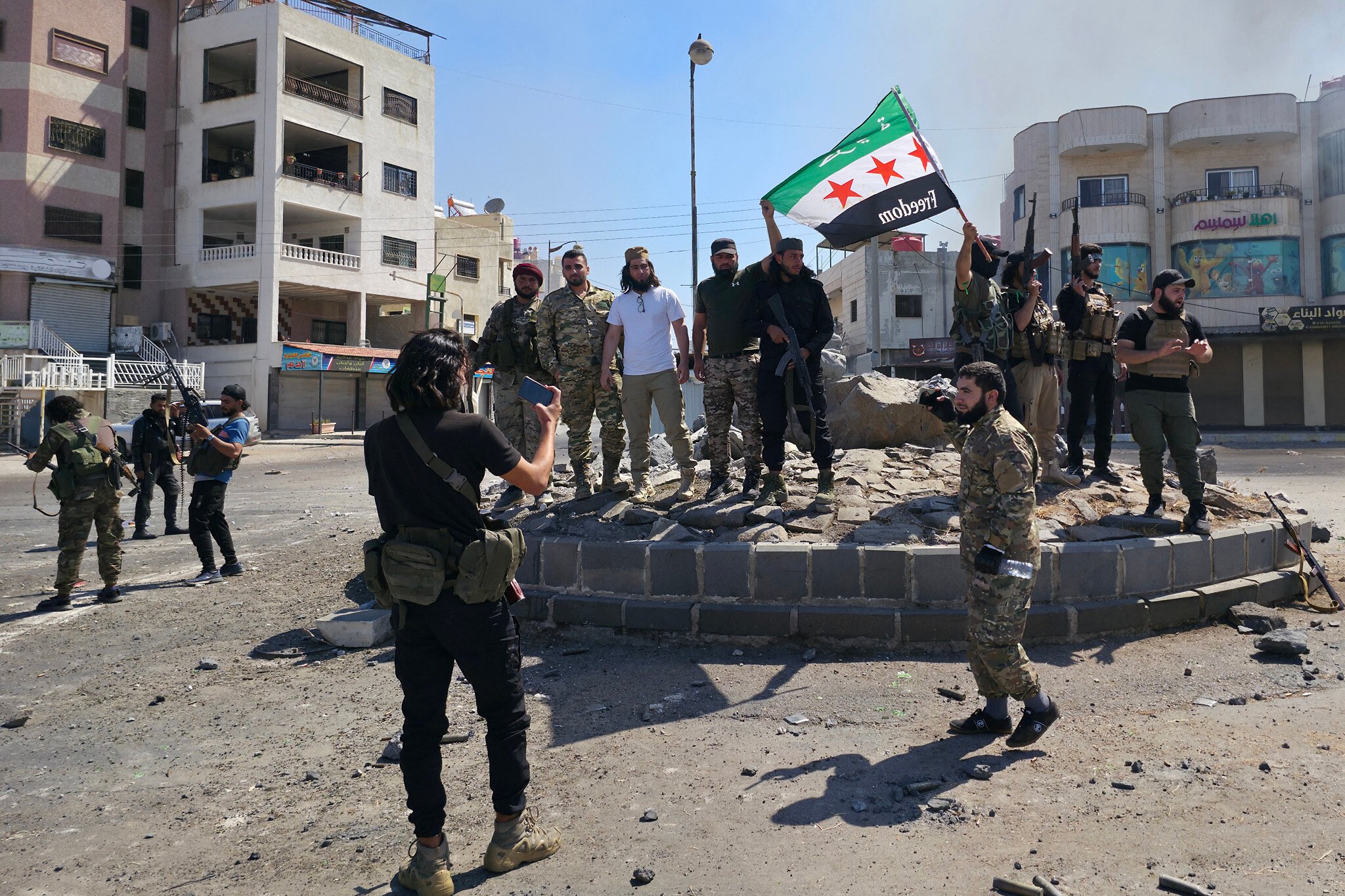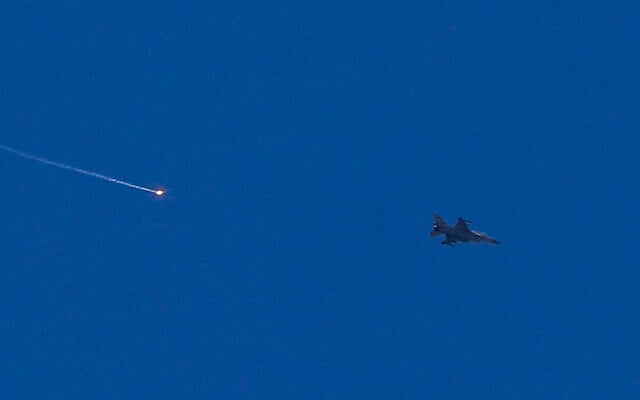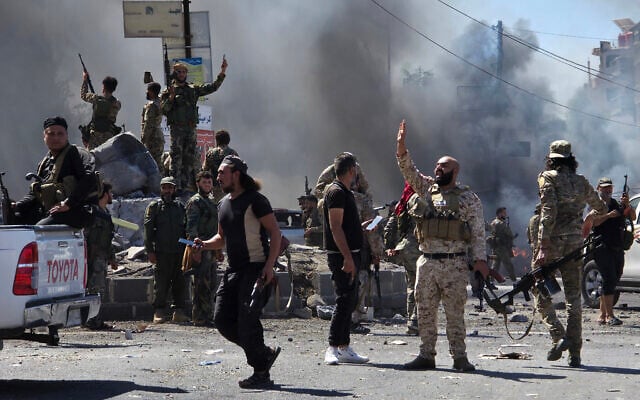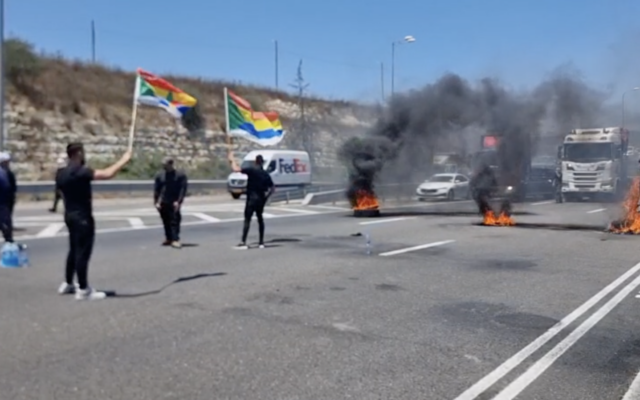



Syria on Tuesday condemned Israel’s airstrikes on the southern province of Sweida, which targeted government forces as they entered the region where bloody sectarian clashes with local Druze militias have raged in recent days.
“The Syrian Arab Republic condemns in the strongest terms the treacherous Israeli aggression carried out today through coordinated drone attacks and military airstrikes,” the foreign ministry said in a statement.
The statement said that “a number of our armed forces and security personnel” as well as “several innocent civilians” were killed.
Damascus “holds Israel fully responsible for this aggression and its consequences,” it added, stressing Syria’s “legitimate right to defend its land and its people by all means permitted under international law.”
Earlier Tuesday, Israel carried out a heavy bombing campaign against Syrian government forces as they were rolling into the Druze-majority Sweida, in what Prime Minister Benjamin Netanyahu and Defense Minister Israel Katz said was meant to protect “the Druze in Syria due to the deep brotherly alliance with our Druze citizens in Israel.”
They said the entry of Syrian soldiers and arms into the area contravened “the demilitarization policy that was decided, prohibiting the entry of forces and weapons into southern Syria that endanger Israel.”
The IDF said it struck “several armored vehicles, including tanks, armored personnel carriers, multiple rocket launchers, as well as access routes, to disrupt their arrival in the area,” after identifying an armored column moving toward Sweida on Monday night.
The strikes marked a rare direct attack on forces loyal to the new leadership in Damascus that Jerusalem had seen as a potential ally.
According to Channel 12, Israel had warned interim Syrian President Ahmed al-Sharaa not to harm the Druze population ahead of its recent strike on regime targets.
Multiple communications were conveyed to Damascus in advance through diplomatic channels, including the American and the French, the report said.

“If the Syrian regime will harm the Druze, they will have given us no choice but to intervene,” Foreign Minister Gideon Sa’ar told his French counterpart, Jean-Noel Barrot, over the phone on Monday, the report said.
A senior Israeli official cited by Channel 12 said that recent events reflect growing instability in Syria, casting doubt on the regime’s ability to govern effectively. If the situation does not improve, Israel now sees little chance of even a modest breakthrough in talks with the new government in Damascus, the official said.
The strikes took place amid internecine fighting that erupted Sunday in southern Syria and left nearly 100 people dead.
Damascus declared a ceasefire in the town on Tuesday morning, but clashes reportedly continued.

The mainly Druze residents of Sweida had hoped the arrival of government forces on Tuesday would spell an end to deadly sectarian clashes with local Bedouin tribes.
Instead they spoke of executions, looting and arson as government troops and their allies rampaged through Druze neighbourhoods, prompting thousands from the religious minority to flee.
“Government forces entered the city on the pretext of restoring order… but unfortunately they indulged in savage practices,” said Rayan Maarouf, editor in chief of the Suwayda 24 news website.
“There have been cases of civilians being killed… dozens of them… but we don’t have precise figures,” he added, blaming government fighters and their allies.
According to the Syrian Observatory for Human Rights, government forces executed 12 civilians in a guesthouse in the city, in just one incident among many said to have taken place in the area.
Additionally, it said an armed group affiliated with government security forces opened fire on three siblings near the al-Basha roundabout north of Sweida city while they were with their mother, who witnessed the killings.
Unverified video footage circulating on social media showed armed men forcibly shaving off the moustache of an elderly Druze, a grave insult in the community.

Responding to the carnage, dozens of Israeli Druze civilians on Tuesday crossed the border into Syria near the Druze town of Majdal Shams in the Golan Heights.
The military said the civilians who crossed the border were detained, adding that “IDF troops are currently working to safely return” them to Israeli territory.
In northern Israel, hundreds of Druze Israelis staged protests in several locations, demanding that the government do more to intervene in support of their coreligionists.
Demonstrators torched car tires and blocked traffic in several locations.
Police said that Route 6 near Elyakim Junction was closed to traffic in both directions as a result of the demonstrations. Other small protests were reported near Shfaram and Rameh, Arab locales further north.
Police said they were present at the protests and attempted to “maintain public order and guide drivers to alternate routes” that aren’t blocked to traffic.
As the clashes between Syrian forces and Druze militias continued, Diaspora Affairs Minister Amichai Chikli directly called for Syrian President Sharaa to “be eliminated without delay,” in both English and Hebrew posts on his X account.
Following Israel’s announcement Tuesday morning that it will strike Syrian regime targets in response to reported attacks against the Druze population by Sharaa’s forces, Chikli wrote: “Anyone who thinks Ahmad al-Sharaa is a legitimate leader is gravely mistaken — he is a terrorist, a barbaric murderer who should be eliminated without delay.”
Since Sharaa took power in Syria late last year, Israeli officials — including Netanyahu and Foreign Minister Sa’ar — initially took a harsh stance against the new regime, citing his past ties to Al-Qaeda and clashes between government forces with Druze, Alawite, and other minority groups.
However, Israel’s tone changed following US President Donald Trump’s decision to lift sanctions on Syria in May, and efforts have reportedly been underway between Israel and Syria to reach a security, or even a peace, agreement.
